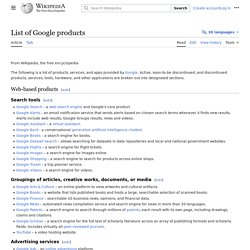

Gmail: Email from Google. Calendar. Google Reader joins graveyard of dead Google products. It’s hard to lose a loved one, especially if that loved one is a Google service.
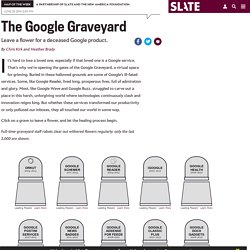
That’s why we’re opening the gates of the Google Graveyard, a virtual space for grieving. Buried in these hallowed grounds are some of Google’s ill-fated services. Some, like Google Reader, lived long, prosperous lives, full of admiration and glory. Most, like Google Wave and Google Buzz, struggled to carve out a place in this harsh, unforgiving world where technologies continuously clash and innovation reigns king. But whether these services transformed our productivity or only polluted our inboxes, they all touched our world in some way. Click on a grave to leave a flower, and let the healing process begin. Full-time graveyard staff robots clear out withered flowers regularly; only the last 3,000 are shown. Google I/O (googleio) Google+ Earth. Sky. Alerts.
SketchUp. 3D Warehouse. Google Translate now serves 200 million people daily. SAN FRANCISCO -- Google Translate provides a billion translations a day for 200 million users, the company revealed here Friday at its Google I/O show for developers.
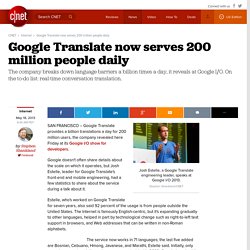
Google doesn't often share details about the scale on which it operates, but Josh Estelle, leader for Google Translate's front-end and mobile engineering, had a few statistics to share about the service during a talk about it. Estelle, who's worked on Google Translate for seven years, also said 92 percent of the usage is from people outside the United States.
The Internet is famously English-centric, but it's expanding gradually to other languages, helped in part by technological change such as right-to-left text support in browsers, and Web addresses that can be written in non-Roman alphabets. Building Maker. Chrome. Ngram Viewer. Google Body. Quantitative Analysis of Culture Using Millions of Digitized Books. Google Url Shortener. Posted by Michael Hermanto, Software Engineer, Firebase We launched the Google URL Shortener back in 2009 as a way to help people more easily share links and measure traffic online.
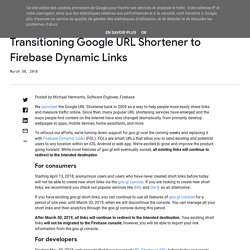
Since then, many popular URL shortening services have emerged and the ways people find content on the Internet have also changed dramatically, from primarily desktop webpages to apps, mobile devices, home assistants, and more. To refocus our efforts, we're turning down support for goo.gl over the coming weeks and replacing it with Firebase Dynamic Links (FDL). FDLs are smart URLs that allow you to send existing and potential users to any location within an iOS, Android or web app.
We're excited to grow and improve the product going forward. For consumers Starting April 13, 2018, anonymous users and users who have never created short links before today will not be able to create new short links via the goo.gl console. After March 30, 2019, all links will continue to redirect to the intended destination. Google Code.
PowerMeter. We launched Google PowerMeter as a free energy monitoring tool to raise awareness about the importance of giving people access to their energy information.

PowerMeter included key features like visualizations of your energy usage, the ability share information with others, and personalized recommendations to save energy. We partnered with device manufacturers and utilities around the world. Many of our partners now have new options available for accessing energy information. We are pleased that PowerMeter helped demonstrate the importance of access to energy information, and created a model for others. We retired the service on September 16, 2011. We continue to see encouraging results about the importance of access to energy data. Momentum is building toward making energy information more readily accessible, and it’s exciting to see others drive innovation and pursue opportunities in this important new market. PostRank.
Technology. The technology behind Google's great results As a Google user, you're familiar with the speed and accuracy of a Google search.
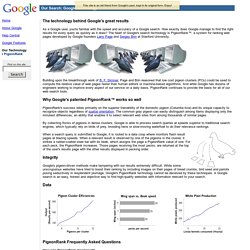
How exactly does Google manage to find the right results for every query as quickly as it does? The heart of Google's search technology is PigeonRank™, a system for ranking web pages developed by Google founders Larry Page and Sergey Brin at Stanford University. Building upon the breakthrough work of B. F. Why Google's patented PigeonRank™ works so well PigeonRank's success relies primarily on the superior trainability of the domestic pigeon (Columba livia) and its unique capacity to recognize objects regardless of spatial orientation. By collecting flocks of pigeons in dense clusters, Google is able to process search queries at speeds superior to traditional search engines, which typically rely on birds of prey, brooding hens or slow-moving waterfowl to do their relevance rankings.
Google Research. Publications by Googlers. Google publishes hundreds of research papers each year.
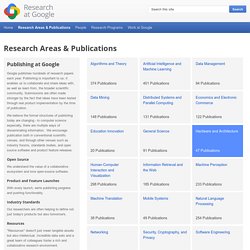
Publishing is important to us; it enables us to collaborate and share ideas with, as well as learn from, the broader scientific community. Submissions are often made stronger by the fact that ideas have been tested through real product implementation by the time of publication. We believe the formal structures of publishing today are changing - in computer science especially, there are multiple ways of disseminating information. We encourage publication both in conventional scientific venues, and through other venues such as industry forums, standards bodies, and open source software and product feature releases. Open Source We understand the value of a collaborative ecosystem and love open-source software. Product and Feature Launches With every launch, we're publishing progress and pushing functionality. Industry Standards Our researchers are often helping to define not just today's products but also tomorrow's.
Resources Impact. Chaîne de googletechtalks. Google Search. Google Search (or Google Web Search) is a web search engine owned by Google Inc.
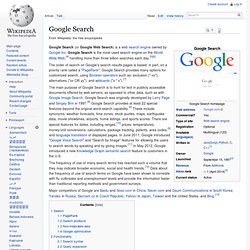
Google Search is the most-used search engine on the World Wide Web,[4] handling more than three billion searches each day.[5][6] Knowledge – Inside Search – Google. Introducing the Knowledge Graph. Google URL Shortener. Picasa. Encyclopédie des produits et services de Google - WebRankInfo. Les produits et services les plus populaires.
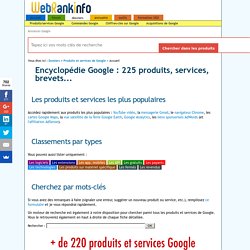
Groups. Category:Google services. List of Google products. Web-based products[edit] Search tools[edit] Advertising services[edit] Communication and publishing tools[edit] Development tools[edit] Security tools[edit] reCAPTCHA – a user-dialogue system used to prevent bots from accessing websites.Google Safe Browsing – blacklist service for web resources that contain malware or phishing content.Titan security hardware chip[22][23]Titan Security Key – a security token.[24]Titan M – in mobile devices starting with the Pixel 3.[25]Titan C – in Chromebooks, for example the Pixel Slate.[26]
